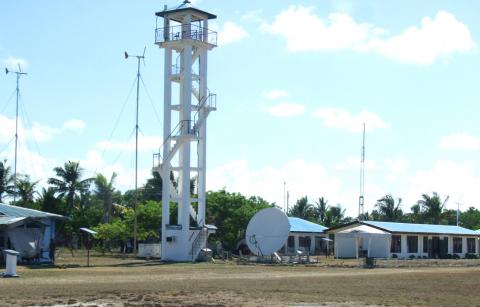Satellite images show China is building an island on a reef in the disputed Spratly Islands (Nansha Islands, 南沙群島) large enough to accommodate what could be its first offshore airstrip in the South China Sea, a leading defense publication said on Friday.
The construction has stoked concern that China might be converting disputed territory in the mineral-rich archipelago into military installations, adding to tensions in waters also claimed by Taiwan, Malaysia, the Philippines, Vietnam and Brunei.
IHS Jane’s Defence Weekly said images it had obtained showed the China-built island on the Fiery Cross Reef (Yongshu Reef, 永暑礁) to be at least 3,000m long and 200m to 300m wide, which it said is “large enough to construct a runway and apron.”

Photo: AFP
The building work flies in the face of US calls for a freeze in provocative activity in the South China Sea, one of Asia’s biggest security issues. Concern is growing about an escalation in disputes even as claimants work to establish a code of conduct to resolve them.
Dredgers were also apparently creating a harbor to the east of the reef “that would appear to be large enough to receive tankers and major surface combatants,” it said.
Asked about the report at a defense forum in Beijing yesterday, Jin Zhirui, a colonel with the Chinese air force command, declined to confirm it, but said that China needed to build facilities in the South China Sea for strategic reasons.
“We need to go out, to make our contribution to regional and global peace,” Jin said. “We need support like this, including radar and intelligence.”
The land reclamation project was China’s fourth in the Spratly Islands in the past 12 to 18 months and by far the largest, IHS Jane’s said.
Beijing has rejected Washington’s call for all parties to halt activity in the disputed waters to ease tension, saying it can build whatever its wants in the South China Sea.

Right-wing political scientist Laura Fernandez on Sunday won Costa Rica’s presidential election by a landslide, after promising to crack down on rising violence linked to the cocaine trade. Fernandez’s nearest rival, economist Alvaro Ramos, conceded defeat as results showed the ruling party far exceeding the threshold of 40 percent needed to avoid a runoff. With 94 percent of polling stations counted, the political heir of outgoing Costa Rican President Rodrigo Chaves had captured 48.3 percent of the vote compared with Ramos’ 33.4 percent, the Supreme Electoral Tribunal said. As soon as the first results were announced, members of Fernandez’s Sovereign People’s Party

EMERGING FIELDS: The Chinese president said that the two countries would explore cooperation in green technology, the digital economy and artificial intelligence Chinese President Xi Jinping (習近平) yesterday called for an “equal and orderly multipolar world” in the face of “unilateral bullying,” in an apparent jab at the US. Xi was speaking during talks in Beijing with Uruguayan President Yamandu Orsi, the first South American leader to visit China since US special forces captured then-Venezuelan president Nicolas Maduro last month — an operation that Beijing condemned as a violation of sovereignty. Orsi follows a slew of leaders to have visited China seeking to boost ties with the world’s second-largest economy to hedge against US President Donald Trump’s increasingly unpredictable administration. “The international situation is fraught

MORE RESPONSIBILITY: Draftees would be expected to fight alongside professional soldiers, likely requiring the transformation of some training brigades into combat units The armed forces are to start incorporating new conscripts into combined arms brigades this year to enhance combat readiness, the Executive Yuan’s latest policy report said. The new policy would affect Taiwanese men entering the military for their compulsory service, which was extended to one year under reforms by then-president Tsai Ing-wen (蔡英文) in 2022. The conscripts would be trained to operate machine guns, uncrewed aerial vehicles, anti-tank guided missile launchers and Stinger air defense systems, the report said, adding that the basic training would be lengthened to eight weeks. After basic training, conscripts would be sorted into infantry battalions that would take

GROWING AMBITIONS: The scale and tempo of the operations show that the Strait has become the core theater for China to expand its security interests, the report said Chinese military aircraft incursions around Taiwan have surged nearly 15-fold over the past five years, according to a report released yesterday by the Democratic Progressive Party’s (DPP) Department of China Affairs. Sorties in the Taiwan Strait were previously irregular, totaling 380 in 2020, but have since evolved into routine operations, the report showed. “This demonstrates that the Taiwan Strait has become both the starting point and testing ground for Beijing’s expansionist ambitions,” it said. Driven by military expansionism, China is systematically pursuing actions aimed at altering the regional “status quo,” the department said, adding that Taiwan represents the most critical link in China’s